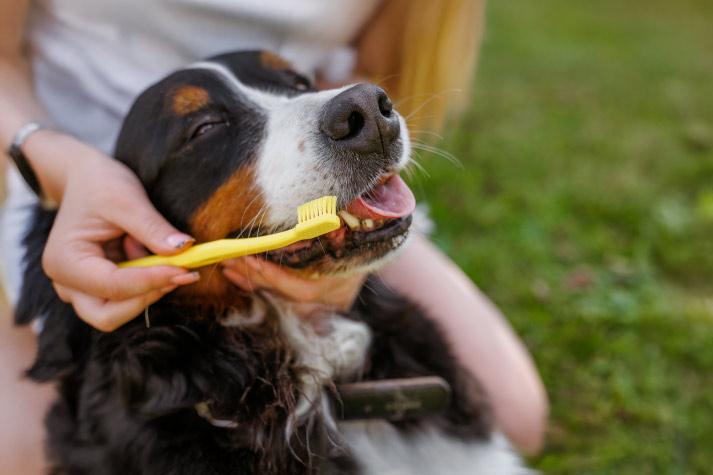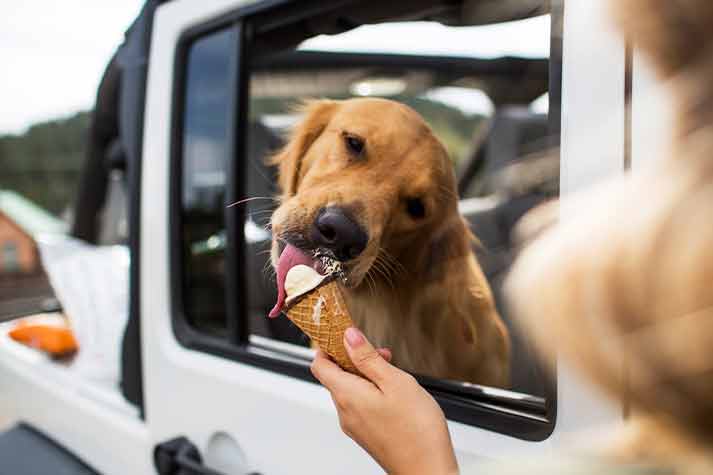
03 May
Tips for Maintaining Your Dog’s Oral Hygiene
Teeth are a fundamentally important part of our bodies. Dogs and humans are somewhat similar in this regard, as we both go through two sets of teeth in our lifetime. Given how important they are and how they only get replaced once throughout a lifetime (milk teeth being replaced by permanent teeth), it is crucial to practice good oral hygiene. The same applies to our pet dogs as well.
A dog’s mouth isn’t expected to be a particularly rosy-smelling place. If anything, dogs are known for bad breath, but this can become an issue as your dog grows, especially since one of the earliest signs of tooth decay is bad breath. As tooth decay is often mistaken for just bad breath, it is important to practice good dental hygiene. And since your dog is unlikely to brush their teeth by themselves, you’ll need to help them. Here are some dog oral hygiene tips to keep your pup’s teeth clean and healthy.
Why Should You Worry About Your Dog’s Dental Health?
Before the ‘how’, you should know the ‘why’. You should be concerned about your pet’s dental health for two reasons.
- The belief that dogs clean their teeth naturally through eating and biting is a myth.
- If left unchecked, your dog runs the risk of developing serious dental conditions by the age of three.
Diseases related to the gums, bones, and supportive tissue of the teeth are known as periodontal diseases. In early stages, this appears as gingivitis (swollen, bleeding gums). In advanced stages, it can lead to periodontitis, where teeth loosen and fall out.
How Often Should You Brush Your Dog’s Teeth?
Brushing isn’t too challenging once your dog gets used to it. Like humans, dogs also benefit from regular brushing to prevent plaque build-up. Start early, when your dog still has their “milk teeth,” so they get comfortable with the routine.
A few tips:
- Use dog-safe toothpaste (never human toothpaste).
- Choose an ergonomic brush or fingertip brush for easier handling.
- Desensitize your dog slowly by letting them sniff and get used to the brush.
Brushing is one of the best answers to how to clean dog teeth naturally.
Are Dental Wipes a Good Alternative to Brushing?
While you’re still training your dog to accept a toothbrush, dental wipes are a great option. These wipes help reduce plaque by friction and are especially handy when traveling. They won’t replace brushing completely, since they can’t reach every corner, but they’re useful for quick cleaning. Many pet parents find them practical during overseas vet care for dog teeth situations, where convenience matters.
What Role Do Dental Chews Play?
Dog chews mimic the natural cleaning action of chewing. By gnawing, your dog scrapes off plaque and strengthens their teeth. Edible chews like chicken strips or durable ones (rubber/nylon) can both be effective. Finding the best dental chews for dogs depends on your pup’s chewing habits and dietary needs, so experiment with a few options.
How Often Should You Take Your Dog to the Vet for Dental Care?
Even with brushing, wipes, and chews, nothing beats professional care. A vet can perform a deep cleaning and spot early signs of disease you might miss. An annual or bi-annual checkup is ideal. If you’re planning to move abroad with your pet, make sure to arrange overseas vet care for dog teeth early, so your dog’s dental health isn’t overlooked during the transition.
Final Thoughts
You might think chewing alone keeps a dog’s teeth clean, but that’s a myth. Dogs need a combination of brushing, wipes, chews, and vet visits to keep their teeth healthy. While daily brushing isn’t always required, regular cleaning is. Rotate between methods and find the balance that works for you and your pup.
If ignored, poor dental health can result in abscesses, permanent jaw damage, infections spreading to the body, and even heart disease. Clearly, maintaining pet dental health before relocation or during everyday life is crucial.
FREQUENTLY ASKED QUESTIONS &
What is the correct order of oral hygiene?
The proper order is to brush your teeth first, then floss to remove anything stuck in between. Finish with a mouth rinse to wash away loosened debris and freshen breath.
Are carrots good for dogs?
Yes, raw carrots are a healthy, crunchy snack for dogs and are low in calories. They also act like natural chews, helping to scrape off plaque from teeth.
Can coconut oil clean a dog's teeth?
Coconut oil has mild antibacterial properties and may freshen your dog’s breath. However, it cannot replace regular brushing, which is far more effective at removing plaque.
Is it safe to let a dog lick your face?
It’s generally not recommended, as dog saliva carries bacteria that may cause infections. While occasional licks are unlikely to harm, avoiding it is the safer choice.
Do pet dental finger wipes work?
Yes, they are handy for quick clean-ups and can reduce surface plaque build-up. Still, they don’t reach deep areas, so brushing is essential for full cleaning.






AUTHOR’S BIO
Carry My Pet
Passionate pet enthusiasts and globetrotters, dedicated to easing furry friends' journeys worldwide. Penning tales of compassion at CarryMyPet, where every relocation is a tail-wagging adventure.